Coronavirus: How will Liverpool's mass testing pilot work?
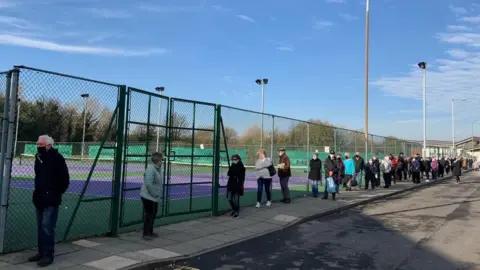 BBC
BBCA mass coronavirus testing programme is being carried out in Liverpool, with all residents - about 498,000 of them - being offered regular Covid-19 tests under the first trial of whole city testing in England.
It is essentially an experiment to see how mass testing could work but Prime Minister Boris Johnson said it had "the potential to be a powerful new weapon in our fight against Covid-19".
What is mass testing?
Mass testing basically means asking everyone to be tested, whether or not they have symptoms.
The Liverpool pilot aims to limit the spread of the virus by identifying as many infected people in the city as possible, and taking action to break chains of transmission.
A significant number of people who become infected with coronavirus show no symptoms but the exact proportion has yet to be determined.
Terry Whalley, Covid-19 testing director for the NHS in Cheshire and Merseyside, said: "We are working on the assumption that we are finding less than half of the people who are walking around with Covid and are therefore inadvertently and unknowingly passing it on to other people."
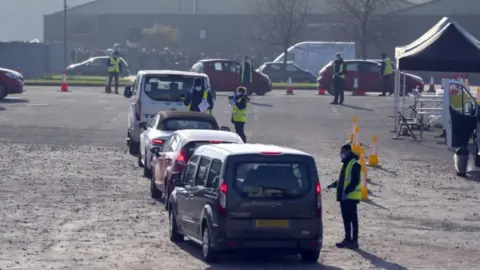 Peter Byrne/PA Wire
Peter Byrne/PA Wire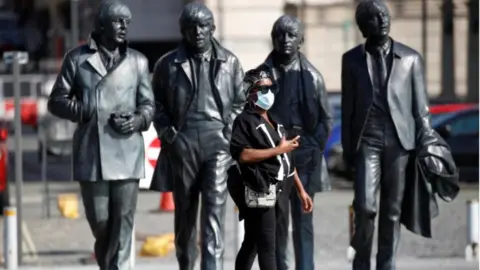 Reuters
ReutersOther countries, such as China, have already introduced mass testing programmes for whole cities.
When six new virus cases were recorded in Wuhan, where the pandemic originated, on 12 May the city quickly put in place ambitious plans to test its entire population of 11 million people.
The outbreak was brought under control.
Who can have a test?
Everyone living or working in Liverpool will be offered tests, regardless of whether they have symptoms, with follow-up tests approximately every two weeks.
People with symptoms should still book in at a test centre but those without symptoms can turn up and take a test at a drop-in centre without an appointment.
This will be entirely voluntary. Nobody is being forced to take part.
Liverpool's public health director Matthew Ashton said he hoped people would come forward.
"People need to understand... what's in it for them and what's in it for the community," he said.
"The motivation is to get the city back to normal in as quick a time as possible, so hopefully we will exit that national lockdown in the best position."
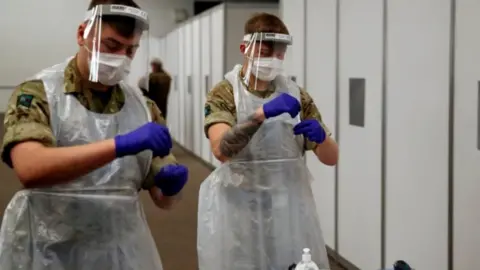 Reuters/Phil Noble
Reuters/Phil NobleMr Whalley asked people to "think about their loved ones".
"You may not feel like you've got symptoms but the testing is there now," he said.
"Please access the testing even if you don't feel unwell because that is how we will identify cases earlier.
"That's how we will keep our loved ones safe and our economy going."
A spokesperson for the Department of Health said the pilot "was planned to last for approximately two weeks" although Liverpool mayor Joe Anderson said he hoped the testing would last beyond a month.
Which tests are being offered?
The pilot offers two types of testing, both involving swabbing the nose or throat.
To find out if someone currently has Covid-19 in the UK, a swab - using a special cotton bud - is taken of the nose or throat and the sample is then sent off to a lab to look for signs of the virus.
This is a PCR (polymerase chain reaction) test, the type that has been most commonly used globally.
It is regarded as the "gold standard" by epidemiologists but may take up to a day or longer to produce a result.
A second type, called a "lateral flow" test, will also be used in the Liverpool pilot.
It involves a handheld kit that gives a result - a bit like a pregnancy test - in about 20 minutes, without the need for a laboratory.
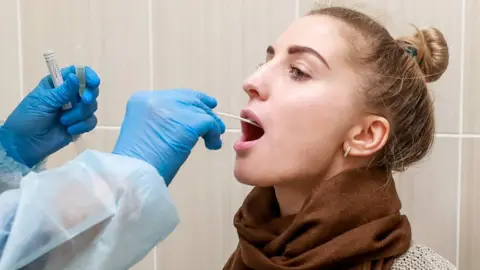 Getty Images
Getty ImagesThere has been some debate over the ability of these rapid tests to detect the infection in the early stages because they need a certain level of the virus in the body to identify it.
Mr Ashton said rapid tests would be beneficial in the Liverpool pilot because "it is not just about the test but everything that wraps around the test".
People will be able to understand their results straight away and then be instantly offered the support they need on how to self isolate, he said, for example "how to access food, access shopping, if they earn a certain level how to access payment".
Anyone on low income who was instructed to self-isolate in a phone call from NHS Test and Trace should be able to claim a £500 payment from their local authority.
Where can I get tested?
Mobile testing sites have been set up across Liverpool, in places such as care homes, schools, universities and workplaces.
People might be invited by their local authority to come for a test but they could also book their own online or whole families could load up the car and just turn up in person.
About 2,000 military personnel are helping with logistics and delivering the tests.
Liverpool has the capacity to carry out 50,000 lateral flow tests and 14,000 PCR tests a day, Mr Ashton said.
That would mean the city could in theory carry out 450,000 tests a week but, in practice, certain groups could be chosen for repeat testing.
If I test positive, do I need to self-isolate?
Anyone who tests positive during the pilot, using either a lateral flow test or an existing swab test, will need to self-isolate along with their household immediately and their contacts will be traced by NHS Test and Trace.
A positive test result would mean a person needing to complete a 10-day isolation period.
Self-isolating means staying at home and not leaving it even to buy food, medicines or other essentials, or for exercise.
Anyone in England who fails to self-isolate after a positive test can be fined up to £10,000.
Why has Liverpool been chosen for the pilot?
Liverpool has the highest rate of coronavirus deaths in England.
As of this week, a third of in-patients in the city's hospitals have Covid-19 and Dr Tristan Cope, Liverpool University Hospitals Trust medical director, said: "We're very close to the limits of what Liverpool hospitals can cope with in terms of the number of patients, particularly without having to postpone more of those urgent surgical procedures."
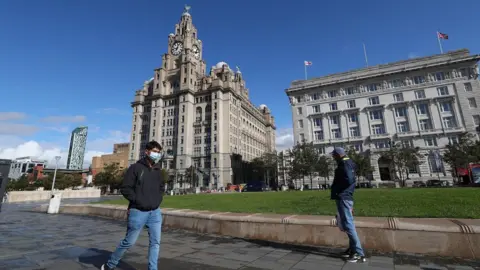 PA Media
PA MediaLiverpool City Region was the first area to be put into the very high alert level of England's three-tier system of Covid-19 restrictions, on 14 October.
Since then, infection rates in the city have declined.
The latest figures showed Liverpool recorded 318 cases per 100,000 in the week up to 2 November. The average area in England had 164.
Mr Whalley said the city had a "track record of communities working together to get on top of outbreaks", such as in Princes Park when a spike was "contained" there in August.
"In the summer there was a huge community call to action and a huge engagement from our communities and I think that's one of the reasons why Liverpool has been chosen to do this pilot now," he said.

Analysis by Rob England, BBC Data Unit
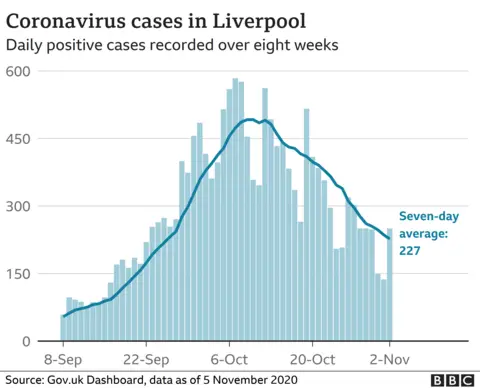
The latest NHS Test and Trace data from 28 May to 28 October shows 18,216 people from Liverpool were transferred to contact tracers. Of those, 14,064 (77%) of which were reached leaving 4,152 (23%) who were not.
Between September and October the number of new daily cases of coronavirus in Liverpool saw a sharp increase, from 59 on 8 September, to a peak of 584 on 7 October.
Since then, there has been an inconsistent decline, with the latest figures from 2 November showing 250 new cases.
This downward trend began just prior to the city entering tier three - very high alert - on 14 October, but has continued since.
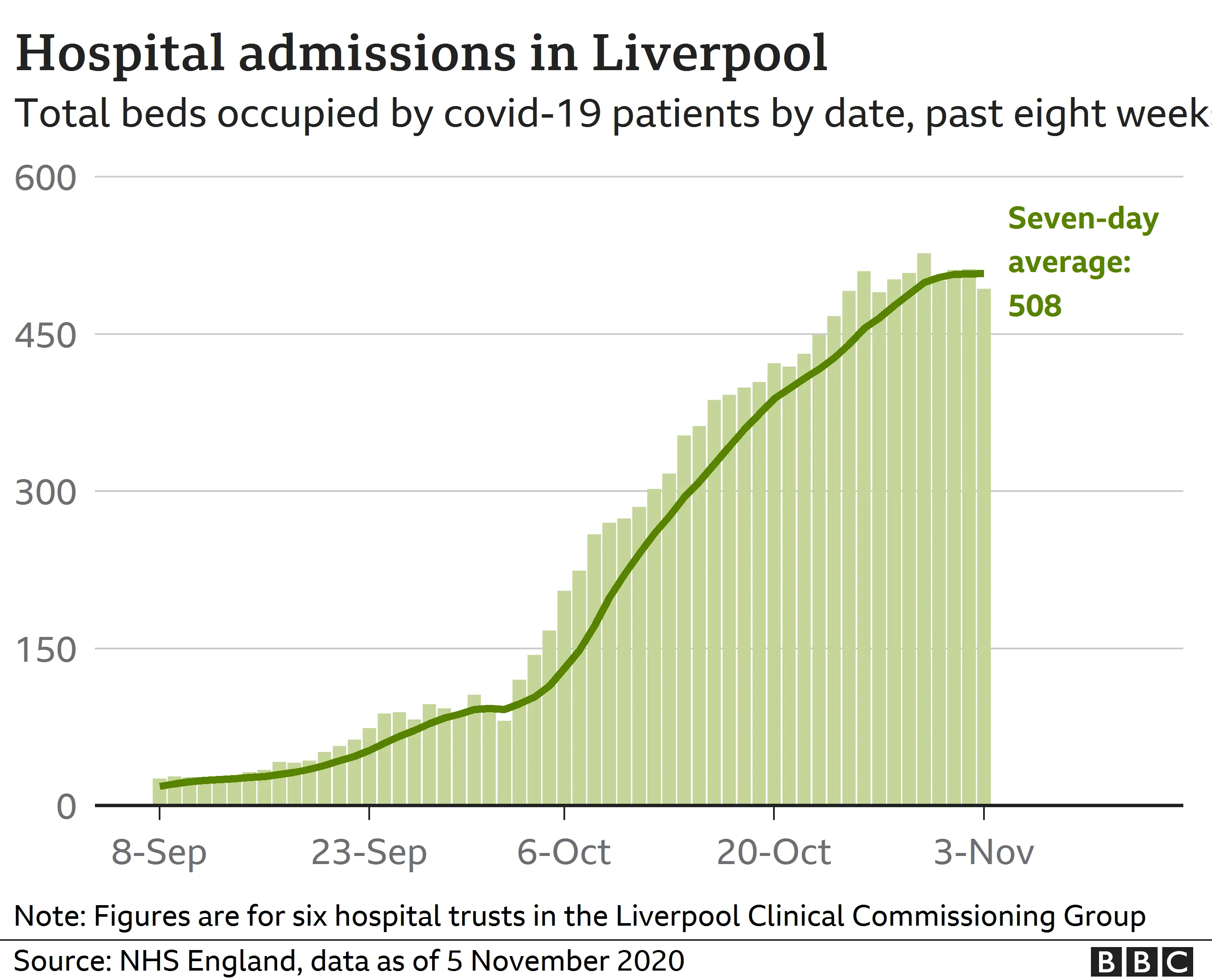
The number of coronavirus patients at Liverpool's hospitals has also risen rapidly since September, but with very little sign of slowing.
Six hospital trusts collectively reported 26 beds occupied by Covid-19 patients on 8 September, but this rose to more than 100 by the end of the month.
The latest figures show numbers peaked over the last eight weeks at 527 Covid patients on 30 October. As of 3 November, 493 beds were occupied.
Since the pandemic began, 604 people from Liverpool have died.
Eight weeks ago there were no deaths in the area, but by 8 October 19 deaths had been recorded over the previous seven days.
Figures for the latest week show a much sharper increase, with 62 deaths recorded in the week to 5 November. This was the highest number in England.

What difference could mass testing make?
In September the prime minister outlined his "moonshot" plan to control the virus with mass testing, possibly by next spring.
He said that "in the near future" he wanted to start using testing "to identify people who are negative - who don't have coronavirus and who are not infectious - so we can allow them to behave in a more normal way, in the knowledge they cannot infect anyone else".
A rising number of cases across the country led to the prime minister announcing a national lockdown in England which is due to last until 2 December.
Mr Ashton said he was "really excited" about mass testing which could be a "game changer" and if people in Liverpool got behind the pilot they could "knock this out of the park" and "leave the national lockdown in a really strong position".
The city's mayor Mr Anderson said the pilot was "really positive for the city".
"It hopefully means that when we come out of national lockdown... that Liverpool will be able to come out of tier three and go into a lower tier, enabling us to have eased measures heading towards Christmas," he said.
What happens at the end of the pilot?
Mr Whalley said everyone in Liverpool was being offered testing but there would not be a "hard line" around the city and it would "blur the boundaries".
He said he was "very keen to make sure that we roll this out as quickly as we can into other parts of Merseyside and Cheshire as rapidly as we can".
"We are acting as a pilot for the country and Liverpool is using its spirit of determination and willing to do what's required to prove that this can have an impact," he added.
The prime minister said: "Dependent on their success in Liverpool, we will aim to distribute millions of these new rapid tests between now and Christmas and empower local communities to use them to drive down transmission in their areas.
"It is early days, but this kind of mass testing has the potential to be a powerful new weapon in our fight against Covid-19."

What do I need to know about the coronavirus?
- SOCIAL DISTANCING: What are the rules now?
- SUPPORT BUBBLES: What are they and who can be in yours?
- FACE MASKS: When do I need to wear one?
- SCHOOLS: What will happen if children catch coronavirus?
- LOOK-UP TOOL: How many cases in your area?

Why not follow BBC North West on Facebook, Twitter and Instagram? You can also send story ideas to [email protected]
